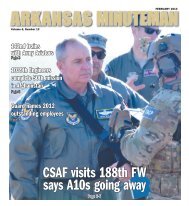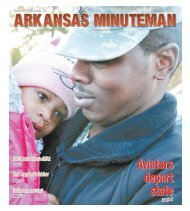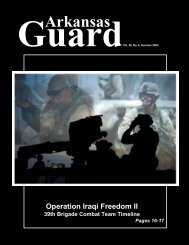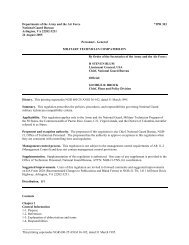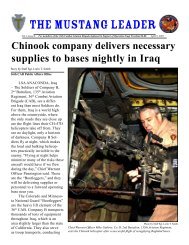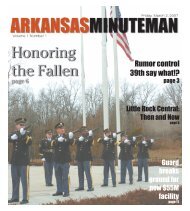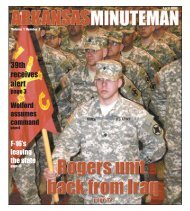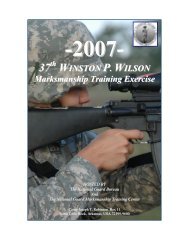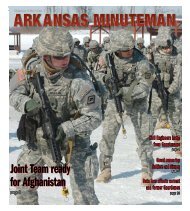The <strong>Arkansas</strong> Minutemancover storyPTSD, continued from page 31harder for them to sleep and concentrate adding irritability totheir list of obvious symptoms.Other common reactionsOther common reactions to combat stress include:• Depression — Feeling down or sad more days than not, andloosing interest in hobbies or activities that used to be enjoyableor fun. Depression also involves a feeling of hopelessness ordespair, or the feeling that things are never going to get better.• Suicidal thoughts — War experiences and combat stressreactions, especially personal loss, can lead a depressed person toconsider hurting or killing themselves.• Anger or aggressive behavior — Anger and irritability aresymptoms of PTSD and often associated with fear or loss of control;someone who is physically tense tends to be angry as well.A typical example is over reacting with anger to the slightestprovocation.• Alcohol and/or drug abuse — “Self medicating” by drinkingor abusing drugs is a common way many cope with upsettingtraumatic stress reactions. When a person wants to avoid thememories or feelings associated with combat, alcohol or drugsseem to offer a quick solution, but they actually lead to moreproblems.• Self blame, guilt and shame — Sometimes service memberstake too much responsibility for bad things that happened, forwhat they did or did not do or for surviving when others didn’t.Guilt and self blame are common for those who have beenthrough difficult combat situations.Headaches, gastrointestinal complaints, immune systemproblems, dizziness, chest pain and discomfort in other parts ofthe body are common in people with PTSD.Effects on family lifeSometimes the everyday stress of family life can feel overwhelmingfor the service member. He or she may become moreirritate or react more strongly to typical family issues, frighteningspouses and children, and even the service member. Continuedangry outbursts or over-reacting or everyday situations may indicatea need to seek help.Men and women often differ in the way in which they integrateback into the family. IN coping with stress men may isolatemore and leave the home to be with friends or buddies. Womenmay need to communicate more with their partners. Some malepartners may experience resentment or misunderstanding towardsthe returning woman veteran, and are reluctant to sympathizewith her experiences in the combat area.Also, children may feel resentment, abandonment, sorrowor anger when a parent leaves. A child may have learned to relymore on the parent who remained at home, and homecomingmay bring back the child’s normal fears of separation.Problems with family relationships, or relationships withother people, should not be overlooked. Initial difficultiescan turn into marital separation and divorce, family violenceand caregiver burden. Communication is essential to workingthrough these problems, as is talking to a counselor or seekinghelp at every level.Getting helpCombat stress reactions usually go away over time. But ifthey persist the Soldier or Airman may develop PTSD. The goodnews is that there are effective treatments to PTSD and many ofthe symptoms discussed above.Counseling for combat stress reactions or PTSD is quitepractical and involves common sense steps. The person hasregular conversations with a trained professional. They learnabout PTSD and how it is affecting them and those around them.They may even talk with other service members who served incombat operations as a way to give and receive support.Service members and their families may receive treatmentfor war zone related problems from a number of qualifiedsources, including chaplain services, mental or behavioral healthservices through hospitals or clinics, primary care physicians ornursing and family assistance programs.Many <strong>National</strong> <strong>Guard</strong> and Reserve members will receivetreatment for PTSD at VA PTSD treatment programs andReadjustment Counseling Service Vet Centers. Most treatmentis performed in an outpatient setting while the service membercontinues to live at home and attend individual appointments andgroup sessions.Where ever the Soldier or Airman seeks help, the treatmentusually focuses on assessment, learning, coping, medication andtherapy.Common therapies for treating PTSDPTSD is often treated through a variety of forms of psychotherapyand drug therapy. There remains no definitive treatmentand no complete cure, but some treatments appear to be promising,especially cognitive-behavioral therapy and medication.• Cognitive-behavioral therapy (CBT) — This has beenshown to be the most effective treatment for PTSD. CBT involvesworking with thoughts to change emotions, thoughts andbehaviors. There are several types of CBT:Exposure therapy uses careful, repeated and detailed imaginingof the trauma (exposure) in a safe, controlled environment tohelp the person face and gain control of the fear and distress thathas overwhelmed them.Cognitive restructuring allows patients to identify andPage 32 Summer Fall 2005 2006
The <strong>Arkansas</strong> Minutemanexamine upsetting thoughts about their trauma, challenge thosethoughts and replace them with more balanced and accuratethoughts.Stress inoculation training reduces symptoms throughanxiety reduction techniques, by teaching coping skills and bycorrecting inaccurate thoughts related to the trauma.• Medication — Many drugs can reduce PTSD symptoms, aswell as the anxiety, depression and insomnia often associatedwith PTSD. The most widely used drug treatments are the selectiveserotonin reuptake inhibitors such as Prozac and Zoloft.Basically, medication is used to help relieve the distressingsymptoms of PTSD, making it possible for the patient to participatein CBT programs.• The family — Adult family members can help their lovedone by learning and understanding some of the possible stressorsand emotions a veteran may experience after being in a war zone.The family’s most important role is to be genuine, loving, supportiveand assertive in expressing their own needs and expectation.They also need to be supportive and respectful of the vet’sneed for real time to adjust.Family members should be ready to learn and accept newskills or tolls for coping used by the service member. Having adiscussion about potential “triggers” will allow both partners tounderstand what might cause an upsetting reaction.It’s also important to remember that everyone counts. Thespouse or partner at home should be prepared to seek counselingfor themselves and children if needed. Often times couplescounseling can help to identify the needs of individual familymembers.Encouraging veterans to seek helpAdult family members are often the first to notice a problem.While the vet needs some practical time to acclimate, problemsthat continue over several months may turn into negative habitsand family patterns. Encouraging the vet to seek help when he orshe is using negative strategies to cope with stress.Getting help may not always be easy. A study of Soldiersreturning from Iraq found that only 40% experiencing mentalhealth problems said that they were interested in receiving help.Many avoid treatment for fear that it will hurt their image or ruintheir military careers.The most important task for family members is to encouragethe vet to seek counseling and treatment. Effective treatmentsexist and early treatment can prevent the problems from gettingworse. Encouraging the vet to seek help is a benefit for allconcerned.Combat stress reactions are like any other physical injuryfrom war. There is a range of how severe these invisible injuriesare, just as with physical injuries. If problems do persist, treatmentmay help everyone lead a happier, more well-adjusted life.Where to go for helpand information• VA Services —www1.va.gov/health_benefits/• VA Health Centers —Located across the country• VA Centers —1-877-VETS or www.vba.va.gov/EFIF1-800-827-1000 or www.va.gov/rcs• Veteran Service Organizations (VSOs)www.va.gov/vso• VA Readjustment Counseling —1-800-905-4675• NCPTSD —www.ncptsd.va.gov• NGB Family Program —www.guardfamily.org• Army Familys Online —www.armyfamiliesonline.org• American Red Cross AFES —www.redcross.org/services/afes• Military One Source —www.militaryonesource.com• Military Homefront —www.militaryhomefront.dod.mil/• Air Force Family Advocacy Program —www.airforcefap.org/home.asp• <strong>Arkansas</strong> Family Readiness —www.guardfamily.net/• 189th AW Family Readiness —www.arguard.org/189/family.htm• 188th FW Family Readiness —www.arftsm.ang.af.mil/site/FWFRG.aspSummer Fall 20052006 Page 33



